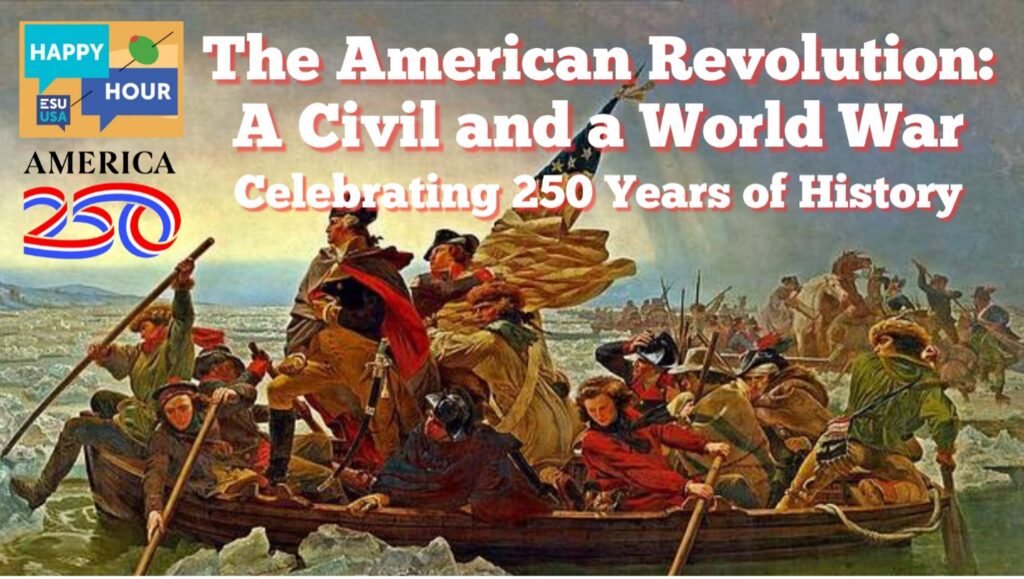
- This event has passed.
The American Revolution: A Civil and a World War
January 14 @ 5:00 pm – 6:00 pm EST

As the calendar turns to 2026, The English-Speaking Union of the United States begins a year-long celebration of 250 years of American independence. Throughout the year, ESU will feature several Happy Hours that give us an opportunity to pause and reflect on this historic milestone.
The American Revolution was a war unlike any other—one of ideas and ideals, that shaped “the course of human events.” With 165 principal engagements from 1775-1783, the Revolutionary War was the catalyst for American independence. The Revolutionary War was not just a civil war conflict between colonists who remained loyal to the Crown and those who sought independence from British rule. When other European powers like France and Spain officially entered the war, it expanded into a global clash of empires—a veritable World War.
Today’s Happy Hour guest speaker, Dr. Henry (Phil) Williams III, president of ESU’s Charlottesville, VA Branch, will describe the early beginnings of the war from 1775 through 1783. He will illustrate the eight-year conflict between Great Britain and its thirteen North American colonies beginning with the Battles of Lexington and Concord and ending with the Treaty of Paris in 1783, which formally recognized American independence.
Williams will explain that the true history of the Revolution must not be taught just from an American-centric focus, but also how England, the Commonwealth, and Europe viewed and, in fact, taught this period of history quite differently.
Join us as the ESU launches a journey toward this landmark event as we commemorate the 250th anniversary of the signing of the Declaration of Independence. This Happy Hour is sponsored by the ESU Charlottesville, VA Branch. ESU Happy Hour programs are online, free to attend, and open to all members and the public. Registration is required to receive the webinar link.
About Dr. Henry (Phil) Williams III
Dr. Williams is originally from Michigan. He received degrees and diplomas from Culver Military Academy, the University of Virginia, the University of Edinburgh, Scotland, the University of Florence, Italy, and two Master’s and a Doctorate in International Law and Diplomacy from the Fletcher School of Law & Diplomacy, Tufts University.
He has lived in four foreign countries and has studied and worked professionally in four foreign languages: French, Greek, Italian, and Turkish.
Formerly a Wall Street and International Investment Banker, he currently lectures on a variety of topics, including American History, Turkey, and the Middle East. He has been featured on National Public Radio related to several of his interests, has written many news commentary pieces on Turkey and the Middle East, and has published scholarly articles on Ottoman and Turkish Law. He has been teaching a course at Koç University, Istanbul, Türkiye, titled “Turkey and America, East and West – Where the Twain Meet” since 2015.
Dr. Williams is the President of the Charlottesville Branch of the English-Speaking Union and a past Virginia State President of the Sons of the American Revolution with which he is still active. He served on the board of the American Friends of Turkey for over twenty-three years.
He is an avid sportsman with keen interests in equestrian pursuits, racquet sports and swimming. He also inherited a love of Antique and Classic cars and has been active in his local car club for many years. Marilyn Williams is his wife, and they have two grown children, Margaret and Phillip.
What did a Revolutionary Period Happy Hour Look Like?
The Founding Fathers drank a wide variety of alcoholic beverages, including whiskey, rum, ale, beer, cider, wine (Madeira, claret, and champagne), and punch. Popular drinks often served at official functions included Madeira wine and various punches. Many of the founders had specific preferences; for example, John Adams favored hard cider and Madeira, while George Washington was a fan of whiskey and Madeira. Non-alcoholic drinks like cider, small beer (a low-alcohol brew), and coffee were also commonly consumed for refreshment and social reasons.